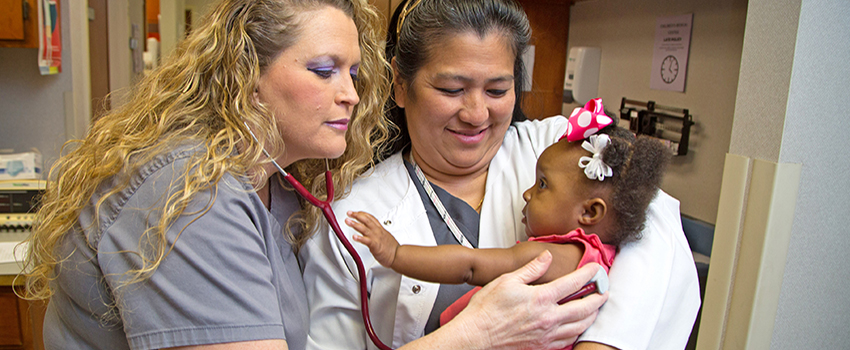Family Nurse Practitioner - Online DNP Program

A Family Nurse Practitioner (FNP) is a master’s or doctorally prepared advanced practice nurse who provides advanced nursing care to families and family members of all ages in primary care clinics, health departments, rural health clinics and other out-patient settings. Classes are online.
Graduates from our program are often employed in family medicine offices, community health agencies, hospitals, private practices, health departments, orthopedics and other specialty areas.
All students in the Family Nurse Practitioner specialty are required to attend one* mandatory clinical skills intensives on-campus. Instruction is provided by the USA Simulation Program. Students must sign-up to attend one session and can select preferred dates on a first come, first serve basis. Simulation will contact students with information on how to sign-up three months prior to the scheduled dates.
Please note the dates are for Clinical Skills Intensives only. The track coordinator may provide orientation dates, which are separate from CSI and Simulation. The clinical skills intensive provides hands-on instruction for common advanced practice assessments and procedures pertinent to the specialty and occurs during the spring semester when the student is enrolled in the first clinical course (CMN 573).
The program does not require a thesis or dissertation; however, students are required to complete an evidence-based scholarly project that results in a quality improvement change and has a substantial effect on healthcare and patient outcomes. Residency requirements for the scholarly project can be completed in the student’s home region with an approved mentor.
BSN-DNP students complete all support, MSN specialty, DNP Core, DNP Project Planning & Development and Residency courses for a total of 69 credit hours. The following DNP core courses are required for the completion of the MSN degree: NU 607, NU 608, NU 610, and NU 613. Both MSN and DNP degrees must be completed within seven years. The MSN portion must be completed within the first five years of the program.
MSN-DNP students adding a new specialty must complete the support courses if they have not previously completed the courses in their MSN program. They must complete the specialty courses and support courses, if needed, to complete the Post-Graduate Certificate. The DNP core, DNP Project Planning & Development, and Residency courses are required for completion of the DNP degree. This program is a total of 60 credit hours or 69 credit hours if support courses are needed. The Post-Graduate Certificate must be completed within two calendar years. The student has seven years to complete both the Post-Graduate Certificate and DNP degree for this program.
MSN-DNP for Advanced Practice Roles must only complete the DNP core, DNP Project Planning & Development, and Residency courses to complete the DNP degree. This is a total of 36 credit hours. The student has a total of seven years to complete the degree requirements.
| Curriculum |
|---|
| Support Courses |
| NU 518 - Advanced Nursing Assessment 3 credit hours |
| NU 545 - Physio-pathological Basis of Advanced Nursing 3 credit hours |
| NU 578 - Pharmacology for Advanced Practice Nurses 3 credit hours |
| Family NP Specialty Courses |
| CMN 568 - Introduction to Family NP 3 credit hours |
| CMN 571 - Health Promotion/Disease Prevention & Issues for Family NP 2 credit hours |
| CMN 572 - Family NP I 3 credit hours |
| CMN 573 - Family NP Practicum I - 180 Clinical Hours 3 credit hours |
| CMN 574 - Family NP II 3 credit hours |
| CMN 575 - Family NP Practicum II - 180 Clinical Hours 3 credit hours |
| CMN 576 - Family NP Practicum III - 240 Clinical Hours 4 credit hours |
| CMN 577 - Family NP III 3 credit hours |
| DNP Core Courses |
| NU 607 - Scientific Underpinnings of Advanced Nursing Practice 3 credit hours |
| NU 608 - Evidence-Based Practice and Quality Improvement in Healthcare 3 credit hours |
| NU 610 - Healthcare Policy and Finance 3 credit hours |
| NU 613 - Organizational & Systems Leadership 3 credit hours |
| NU 611 - Translating Evidence Into Practice Systems 3 credit hours |
| NU 612 - Clinical Prevention and Population Health 3 credit hours |
| NU 615 - Quality Improvement and Outcomes Assessment 3 credit hours |
| NU 616 - Data Management & Decision Making in Complex Healthcare Systems 3 credit hours |
| Family NP DNP Project Planning & Development and Residency |
| CMN 680 - Family NP PP&D 3 credit hours |
| CMN 681 - Family NP Residency I - 180 specialty clinical hours 3 credit hours |
| CMN 682 - Family NP Residency II - 180 specialty clinical hours 3 credit hours |
| CMN 683 - Family NP Residency III - 180 specialty clinical hours 3 credit hours |
The University of South Alabama Master of Science in Nursing (MSN) program provides the skills necessary for a rewarding career. Graduates are eligible and prepared to complete the appropriate national certification exam and apply for licensure to practice as an Advanced Practice Registered Nurse (APRN). It is the graduate’s responsibility to ensure the program meets the requirements to practice in their selected state or U.S. territory.
Contacts
Please feel free to contact Dr. Shannon Harris for more information about this specialty: shannonharris@southalabama.edu.
